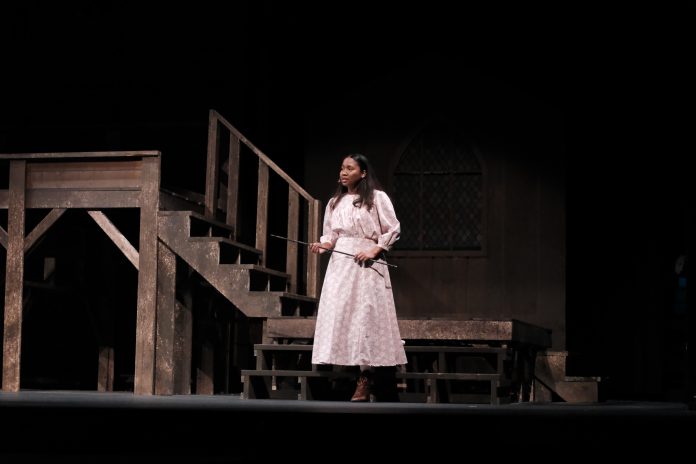
On Oct. 2, the DePauw Theater and Institute of Music opened the year with "Spring Awakening," based on the 1891 play written by Frank Wedekind. This powerful story confronts themes of rebellion, sexual awakening, self-discovery and the consequences of ignorance and repression from the perspective of adolescence in the conservative society of late 19th-century Germany.
Why this musical? Gabby Jones ‘27, playing Wendla Bergman, and Emelia Parson ‘27, playing Ilse Neuman, explained that the musical was chosen with the intention to explore a very human concept. The play emphasizes the undeniable part of human nature, challenges the DePauw student body to explore difficult concepts and hear hard stories relating to teen suicide, domestic violence and sexual awakening.”
The story begins with Bergman, who asks her mother where babies come from, foreshadowing her eventual pregnancy. The scene shifts to Melchior Gabor, played by Devin Best ‘27 and his friend Moritz Stiefel, played by Brenden Ward ‘28, discussing Stiefel’s sexual dreams that have been seriously keeping him awake at night. Stiefel breaks down due to the fear of being beaten by his father over his failed academics. His mental state continues to spiral due to his father's pressure until his final choice to take his own life.
Ward reflected on the role, “Moritz is the most dramatic and complex character I’ve ever had to play, and he truly shows the range of roles I can embody.” To him, Stiefel is the definition of what happens when parents neglect and beat their children. Ward also highlights the irony of the closing scene, where Stiefel’s father cried for him but couldn’t understand how his abuse impacted his son. The father represents abusive parents who often fail to see how their actions affect the mental faculty of their children.
Parson expressed, “Neuman represents the lonely social outcast who will never be free from abuse. She fled from domestic abuse to an artist colony only to be abused again.” Parson shared that the rock and punk songs transitioned the play to a more modern setting. Especially, in the last song, “The Song of Purple Summers”, the cast changes back to regular clothes to transcend the play into the present day.
The story continued with Bergman chatting with the girls, and Martha Bessel, played by Evelyn Croy ‘28, breaks down about her father’s sexual and physical abuse. Croy recounted, “I’ve never played an emotionally tragic character before. I especially struggled with expressing the emotion of a person who deeply wants help, but feels like they can’t say anything.” To me, playing a character with a wide range of emotions has made her a better actor.
As Ward’s relationship with Gabor blossoms into romantic and sexual attraction, Bergman gets pregnant but doesn’t understand why. She dies from an abortion procedure forced upon her by her mother. In the finale, Gabor’s despair causes him to attempt suicide but he is stopped by Bergman and Stiefel’s ghosts.
Jones shared, "Bergman is a naive but curious girl who is quite unlike myself. I’m a very independent, outspoken, and mature person, so portraying this character helped me consider new ways to approach acting. It was hard to emulate her gentle way of speaking (and) walking. It took effort to understand her choices and commit to them fully because of personal beliefs, but it has taught me not to judge my character based on their situation.”
The cast thanked everyone for being open-minded about the uncomfortable topics in the play, and stated that they appreciate the audience’s support of their effort to highlight difficult experiences. Finally, they say, “We are always looking for new talent. Please join!”


